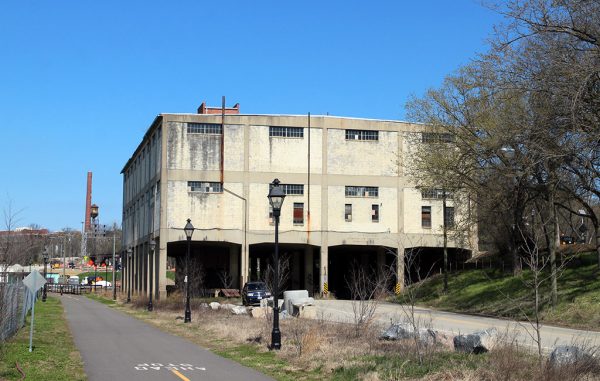
The Intermediate Terminal building overlooks the James River and the Virginia Capital Trail. (Mike Platania)
The future of the old Intermediate Terminal Warehouse will remain in a holding pattern for at least another two weeks.
Richmond City Council on Monday again delayed voting on whether to allow the demolition of the building at 3101 E. Main St., which initially was slated as part of a city-backed plan to be redeveloped as a restaurant for Stone Brewing.
Monday’s continuance marks the fifth time council has delayed voting on the matter since it was proposed in March.
The city and Stone are seeking to raze the 30,000-square-foot building to make way for a 12,000-square-foot structure for World Bistro & Gardens, which the brewery has launched in Southern California and Berlin, Germany.
To move forward with demolition, the incentive-laden agreement that was inked in 2014 between the city and Stone must be altered, a process that needs council approval.
The city and Stone claim the existing building is structurally insufficient to be converted as originally planned – driving up the estimated cost.
The initial agreement in March 2015 called for the city to front $8 million in bonds to fund construction of the bistro, in exchange for Stone leasing the site from the city for at least 25 years to cover the debt.
The amendment would call for that $8 million to still be used by Stone to build the bistro, and in a prior conversation with BizSense, city spokesman Tom Byrnes said Richmond will not provide any additional funds.
City Council now is scheduled to vote on the matter at its June 25 meeting.
Councilwoman Kim Gray said she believes some of the technical language in the amendment has caused the hangup.
For example, Gray said, the initial agreement needed the vote of seven of the nine council members because it involved the transfer of city property, and they’re determining whether a simple 5-4 majority would be needed to make the change.
Stone spokesman Jay Smith echoed that sentiment.
“The amendment had some technical language that the city attorney and Stone’s team have been trying to finalize,” Smith said.
“We don’t anticipate this means any sort of snag in the process, it’s just simply a matter of trying to get it right before going to council.”
He said the delay hasn’t dampened Stone’s enthusiasm to bring a bistro to Richmond, and that the brewery is 100 percent committed to building one.
“We’re eager to move to the next step, but understanding these things can take time and (we) want to get it right,” Smith said.
Several other council members did not return calls and emails about the Stone matter, including Chris Hilbert and Cynthia Newbille, whose district includes the Fulton neighborhood where the Intermediate Terminal building resides.
Gray said she’s on the fence on whether she’d vote for the amendment.
“I haven’t seen any of the proposed changes for the agreement in writing, so I’d have to be able to review that, then make decision from there and listen to what the impacted community wants to say about it,” she said.
The 98-year-old Intermediate Terminal building has been owned by the city since 2015, when it was acquired in a land swap with the family of local restaurateur Richard Ripp. In exchange, the city gave the Ripp family a 0.75-acre parking lot in Jackson Ward that they later sold for $2 million.
The agreement between the city and Stone also included the $23 million in bonds the city provided to build the brewer’s nearby production facility in Fulton, which opened in 2016. That side of the deal also involved a 25-year lease to Stone, with the brewer paying rent, real estate taxes, maintenance costs and insurance.

The Intermediate Terminal building overlooks the James River and the Virginia Capital Trail. (Mike Platania)
The future of the old Intermediate Terminal Warehouse will remain in a holding pattern for at least another two weeks.
Richmond City Council on Monday again delayed voting on whether to allow the demolition of the building at 3101 E. Main St., which initially was slated as part of a city-backed plan to be redeveloped as a restaurant for Stone Brewing.
Monday’s continuance marks the fifth time council has delayed voting on the matter since it was proposed in March.
The city and Stone are seeking to raze the 30,000-square-foot building to make way for a 12,000-square-foot structure for World Bistro & Gardens, which the brewery has launched in Southern California and Berlin, Germany.
To move forward with demolition, the incentive-laden agreement that was inked in 2014 between the city and Stone must be altered, a process that needs council approval.
The city and Stone claim the existing building is structurally insufficient to be converted as originally planned – driving up the estimated cost.
The initial agreement in March 2015 called for the city to front $8 million in bonds to fund construction of the bistro, in exchange for Stone leasing the site from the city for at least 25 years to cover the debt.
The amendment would call for that $8 million to still be used by Stone to build the bistro, and in a prior conversation with BizSense, city spokesman Tom Byrnes said Richmond will not provide any additional funds.
City Council now is scheduled to vote on the matter at its June 25 meeting.
Councilwoman Kim Gray said she believes some of the technical language in the amendment has caused the hangup.
For example, Gray said, the initial agreement needed the vote of seven of the nine council members because it involved the transfer of city property, and they’re determining whether a simple 5-4 majority would be needed to make the change.
Stone spokesman Jay Smith echoed that sentiment.
“The amendment had some technical language that the city attorney and Stone’s team have been trying to finalize,” Smith said.
“We don’t anticipate this means any sort of snag in the process, it’s just simply a matter of trying to get it right before going to council.”
He said the delay hasn’t dampened Stone’s enthusiasm to bring a bistro to Richmond, and that the brewery is 100 percent committed to building one.
“We’re eager to move to the next step, but understanding these things can take time and (we) want to get it right,” Smith said.
Several other council members did not return calls and emails about the Stone matter, including Chris Hilbert and Cynthia Newbille, whose district includes the Fulton neighborhood where the Intermediate Terminal building resides.
Gray said she’s on the fence on whether she’d vote for the amendment.
“I haven’t seen any of the proposed changes for the agreement in writing, so I’d have to be able to review that, then make decision from there and listen to what the impacted community wants to say about it,” she said.
The 98-year-old Intermediate Terminal building has been owned by the city since 2015, when it was acquired in a land swap with the family of local restaurateur Richard Ripp. In exchange, the city gave the Ripp family a 0.75-acre parking lot in Jackson Ward that they later sold for $2 million.
The agreement between the city and Stone also included the $23 million in bonds the city provided to build the brewer’s nearby production facility in Fulton, which opened in 2016. That side of the deal also involved a 25-year lease to Stone, with the brewer paying rent, real estate taxes, maintenance costs and insurance.



